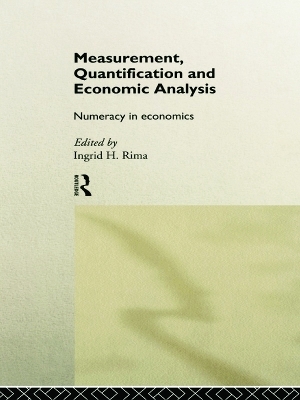
Measurement, Quantification and Economic Analysis
Routledge (Verlag)
978-0-415-75611-2 (ISBN)
Most economists assume that the mathematical and quantative sides of their science are relatively recent developments. Measurement, Quantification and Economic Analysis shows that this is a misconception. Its authors argue that economists have long relied on measurement and quantification as essential tools.
However, problems have arisen in adapting these tools from other fields. Ultimately, the authors are sceptical about the role which measurement and quantification tools now play in contemporary economic theory.
Ingrid Rima is Professor of Economics at Temple University, Philadelphia. She has specialized in the history of economic theory and is president of the History of Economics Society.
1 From political arithmetic to game theory: an introduction to measurement and quantification in economics 2 “I have no great faith in political arithmetick”: Adam Smith and quantitative political economy 3 Ordering society: the early uses of classification in the British statistical organizations 4 Measurement in utility calculations: the utilitarian Perspective 5 Institutional origins of econometrics: nineteenth-century business practices 6 The method of diagrams and the black arts of inductive Economics 7 Jevons versus Cairnes on exact economic laws 8 A reconstruction of Henry L. Moore’s demand studies 9 The probability approach to index number theory: prelude to Macroeconomics 10 The indicator approach to monitoring business fluctuations: a case study in dynamic statistical methods 11 The delayed emergence of econometrics as a separate Discipline 12 Some conundrums about the place of econometrics in economic analysis 13 The right person, in the right place, at the right time: how mathematical expectations came into macroeconomics 14 The New Classical macroeconomics: a case study in the 245 evolution of economic analysis 15 Experimenting with neoclassical economics: a critical review of experimental economics 16 The Carnot engine and the working day 17 The problem of interpersonal interaction: Pareto’s approach 18 Is emotive theory the philosopher’s stone of the ordinalist revolution? 19 If empirical work in economics is not severe testing, what is it? 20 Econometrics and the “facts of experience” 21 Simultaneous economic behavior under conditions of ignorance and historical time 22 Liapounov techniques in economic dynamics and classical thermodynamics: a comparison 23 The Hamiltonian formalism and optimal growth theory 24 The impact of John von Neumann’s method
| Erscheint lt. Verlag | 25.3.2014 |
|---|---|
| Verlagsort | London |
| Sprache | englisch |
| Maße | 156 x 234 mm |
| Gewicht | 680 g |
| Themenwelt | Geschichte ► Teilgebiete der Geschichte ► Wirtschaftsgeschichte |
| Wirtschaft ► Volkswirtschaftslehre ► Ökonometrie | |
| ISBN-10 | 0-415-75611-1 / 0415756111 |
| ISBN-13 | 978-0-415-75611-2 / 9780415756112 |
| Zustand | Neuware |
| Haben Sie eine Frage zum Produkt? |
aus dem Bereich


